Owning a Vauxhall Corsa comes with its own set of joys and challenges. When your “Check Engine” light flashes, deciphering those cryptic Corsa Obd Codes can feel like trying to crack a secret code. This comprehensive guide delves into the world of Corsa OBD codes, empowering you with the knowledge to understand your car’s health and take necessary actions.
What are Corsa OBD Codes?
Your Corsa, like all modern vehicles, is equipped with an On-Board Diagnostics (OBD) system. This sophisticated system continuously monitors various components and systems within your car. When a malfunction is detected, the OBD system generates a specific code, known as an OBD code, and stores it in the car’s computer.
These codes act like your car’s own language, signaling specific issues that require attention. Understanding these codes can save you time, money, and potential headaches down the road.
 Vauxhall Corsa OBD port location
Vauxhall Corsa OBD port location
How to Read Corsa OBD Codes
Accessing and reading Corsa OBD codes requires an OBD-II scanner, a handheld device that connects to your car’s OBD port. The location of the Corsa E OBD port or Corsa D OBD port might vary slightly depending on the model year.
Once connected, the scanner retrieves the stored codes, which typically consist of a five-digit alphanumeric sequence.
Understanding OBD Code Structure
A typical OBD code, like P0301, follows a standardized structure:
- First Character: Indicates the system related to the code. For instance, “P” stands for Powertrain.
- Second Character: Specifies whether the code is generic (“0”) or manufacturer-specific (“1”).
- Third Character: Identifies the specific system within the broader category.
- Fourth and Fifth Characters: Pinpoint the exact issue within the identified system.
Common Corsa OBD Codes
While countless OBD codes can illuminate your Corsa’s dashboard, some are more prevalent than others. Let’s explore a few common ones:
P0420: Catalyst System Efficiency Below Threshold
This code suggests a problem with your Corsa’s catalytic converter. It indicates that the converter isn’t efficiently converting harmful exhaust gases into less harmful ones.
Possible Causes:
- Faulty catalytic converter
- Damaged oxygen sensors
- Engine misfires
P0171: System Too Lean (Bank 1)
This code signifies that the air-fuel mixture in your engine’s combustion chamber is too lean, meaning there’s too much air compared to fuel.
Possible Causes:
- Vacuum leaks
- Malfunctioning mass airflow sensor (MAF)
- Faulty fuel injectors
P0300: Random/Multiple Cylinder Misfire Detected
As the name suggests, this code indicates that one or more cylinders in your Corsa’s engine are experiencing misfires.
Possible Causes:
- Worn spark plugs
- Faulty ignition coils
- Vacuum leaks
U0100: Lost Communication With Engine Control Module (ECM/PCM)
This code points to a communication breakdown between the Engine Control Module (ECM) – your car’s brain – and other control modules.
Possible Causes:
- Faulty ECM
- Wiring issues
- Damaged connectors
 Using an OBD Scanner on Vauxhall Corsa
Using an OBD Scanner on Vauxhall Corsa
What to Do When Your Corsa’s Check Engine Light Turns On
- Don’t Panic: While a flashing “Check Engine” light can be alarming, it doesn’t always signal a catastrophic problem.
- Note Any Symptoms: Pay attention to any unusual noises, performance issues, or changes in fuel economy.
- Read the Codes: Use an OBD-II scanner to retrieve the stored codes from your Corsa D OBD location.
- Research the Codes: Utilize resources like online forums, repair manuals, or consult with a mechanic to understand the potential causes and solutions related to the specific codes.
- Address the Issue: Depending on the complexity and your comfort level, you can attempt DIY repairs or seek professional assistance from a qualified mechanic.
Tips for Preventing Future Corsa OBD Codes
- Regular Maintenance: Adhere to your Corsa’s recommended maintenance schedule.
- Quality Fuel and Fluids: Use high-quality fuel, oil, and other fluids.
- Address Issues Promptly: Don’t ignore warning lights or unusual symptoms.
- Gentle Driving Habits: Avoid aggressive driving that can strain your engine and other components.
“Remember,” says John Smith, a seasoned Vauxhall mechanic with over 20 years of experience, “regular maintenance and addressing issues early on are your best defense against costly repairs down the line.”
Conclusion
While dealing with Corsa OBD codes might seem daunting initially, understanding their meaning and taking proactive steps can save you headaches and keep your Corsa running smoothly. Regular maintenance, prompt attention to warning signs, and a reliable OBD-II scanner are your allies in ensuring your Corsa’s longevity and your peace of mind.
FAQs about Corsa OBD Codes
1. Can I drive my Corsa with the Check Engine light on?
While you might be able to drive for a short distance, it’s crucial to have the issue diagnosed and resolved promptly. Ignoring the warning light could lead to further damage.
2. Will disconnecting the battery reset the OBD codes?
Disconnecting the battery might temporarily clear the codes, but they will reappear if the underlying problem persists.
3. Are all OBD scanners compatible with Corsa?
Most standard OBD-II scanners are compatible with Corsa models manufactured after 1996.
4. Can I fix all Corsa OBD code issues myself?
While some issues might be simple DIY fixes, others require specialized knowledge and tools best handled by a qualified mechanic.
5. How often should I get my Corsa’s OBD system checked?
It’s a good practice to have your car’s OBD system checked at least once a year or as part of your regular maintenance schedule.
Still have questions?
We’re here to help! Contact us via WhatsApp: +1(641)206-8880, Email: [email protected], or visit us at 276 Reock St, City of Orange, NJ 07050, United States. Our team is available 24/7 to assist you.
